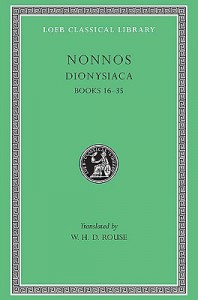
Nonnos II: Dionysiaca, Books 16-35 (Loeb Classical Library, #354)

In my review of the first volume of the DIONYSIACA, I stated that the book felt like a poor man's rendition of Homer and Ovid. As it turns out, I complained far too soon—Nonnus is clearly parodying the epics of old, and infusing it with an utter cynicism that makes manifest one of the greatest critiques of ancient literature ever put to pen.
That, or I've developed literary Stockholm syndrome.
In all seriousness, Nonnus penned DIONYSIACA as the Roman Empire began crumbling into pieces, and it shows in his writing. Honorable warfare and strategy are presented only to be utterly devastated by the uncontrollable whims of the gods, who care little for the morality of their actions. Even in a prolonged siege war a la the myth of Troy, the best warriors have little chance of survival, and great heroes rarely receive honorable deaths for their efforts. Everything represents the failings of Rome in one way or another, especially in terms of hubris. The ridiculousness of Dionysus’ entire campaign would not have been lost on Roman citizens, who were tired of suffering for distant wars that they had no personal stake in.
The philosophies of the old mythologies are despised by the narrative, as Dionysus rewards carpe diem attitudes above all else. In fact, he frequently has to be pressed back into his obligations by other gods, and the Indians themselves are often tricked into unfavorable battles so that the conflict can continue. The fickleness of Dionysus and his fellow deities provides an interesting allegory as to how flawed logic manifests itself in war, and how out-of-touch commanders can doom their legions. In conjunction with Nonnus' attempt to weave together as many myths as possible into a linear narrative, the DIONYSIACA depicts a pessimistic, yet realistic, rendition of truly pagan Greek gods interacting with the world. Nonnus certainly calls into question the purpose of mythology, if nothing else.
The nature of a "hero" is likewise contested by the text, as Dionysus is often compared and contrasted to legendary men, especially Perseus. The difference between the praise Dionysus receives and how he actually conducts himself is clearly intentional, as graphic detail is given to the battles of which Dionysus takes part. Both Dionysus and his enemies try to live up to the tales of old, and they’re even criticized when they fail to do so—despite the text making it exceptionally clear that those stories are impossible to emulate in the real world. Dionysus himself only succeeds by the combined efforts of his divine family aiding him and his utterly ridiculous situations to battle. If Dionysus succeeds at being the ideal of society despite how poorly he fits the image, who's to say the mythic heroes were actually heroic? Disillusionment is the name of the game.
The second volume shines in its depiction of female characters. Unlike the exaggerated and hyperbolic parody of Dionysus’ triumphs and losses, Nonnus appears to have genuine sincerity about the struggles of the women he writes. Men who try to control or hurt women are openly despised by the text, with the sole exception of Dionysus himself. Nonnus often invokes archetypal damsel-in-distress situations solely to give the “damsels” actual agency and power to overcome whatever threatens them. Many of the epic's female cast are both intelligent and fearless, and in many cases they are the true instigators of the plot's progression.
In truth, the only time that the narrative stumbles with women is with the rape of Nicaea--and unfortunately, she's the focus of the very first book of the second volume. On the one hand, she’s unrepentant murderer, and Nonnus evidently doesn’t want to minimize the seriousness of her crime. On the other hand, her rape and the Iliad-esque speech about it is framed as a spoiled brat’s refusal to acknowledge her own complacency in her “punishment” by the gods. The entire situation is extremely similar to date rape, and very uncomfortable to read. Sensitive readers should brace themselves if sexual assault and victim-blaming content bothers them.
Despite my new found appreciation for Nonnus’ jabs at ancient classic literature, the DIONYSIACA continues to be a tedious read. Many of my gripes with the first volume persist into the second, although I still cannot decide whether the problem is with the translation or with Nonnus himself. The story is further hampered by the fact that there are multiple lost sentences and passages of key events in this volume. At least the DIONYSIACA continues to be fascinating, warts and all.

















